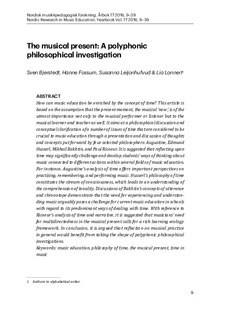The musical present: A polyphonic philosophical investigation
Chapter, Peer reviewed
Permanent lenke
http://hdl.handle.net/11250/2474086Utgivelsesdato
2016Metadata
Vis full innførselSamlinger
- Artikler og bokkapitler [390]
Originalversjon
I: Nordic Research in Music Education. Yearbook Vol. 17 2016, s. 9-39Sammendrag
ABSTRACT --
How can music education be enriched by the concept of time? This article is based on the assumption that the present moment, the musical ‘now’, is of the utmost importance not only to the musical performer or listener but to the musical learner and teacher as well. It aims at a philosophical discussion and conceptual clarification of a number of issues of time that are considered to be crucial to music education through a presentation and discussion of thoughts and concepts put forward by four selected philosophers: Augustine, Edmund Husserl, Mikhail Bakhtin, and Paul Ricoeur. It is suggested that reflecting upon time may significantly challenge and develop students’ ways of thinking about music connected to different actions within several fields of music education. For instance, Augustine’s analysis of time offers important perspectives on practising, remembering, and performing music. Husserl’s philosophy of time constitutes the stream of consciousness, which leads to an understanding of the comprehension of tonality. Discussions of Bakhtin’s concepts of utterance and chronotope demonstrate that the need for experiencing and understanding music arguably poses a challenge for current music education in schools with regard to its predominant ways of dealing with time. With reference to Ricoeur’s analysis of time and narrative, it is suggested that musicians’ need for multidirectedness in the musical present calls for a rich learning ecology framework. In conclusion, it is argued that reflection on musical practice in general would benefit from taking the shape of polyphonic philosophical investigations.
Keywords: music education, philosophy of time, the musical present, time in music
Utgiver
Norges musikkhøgskoleSerie
Nordisk musikkpedagogisk forskning;Årbok 17NMH-publikasjoner;2016:5
